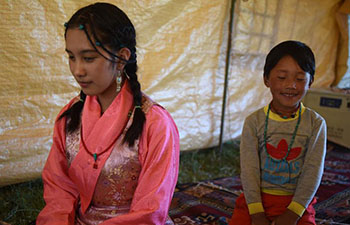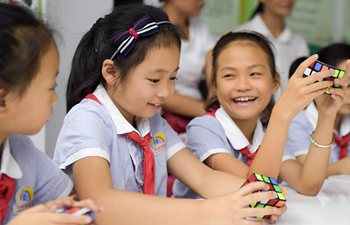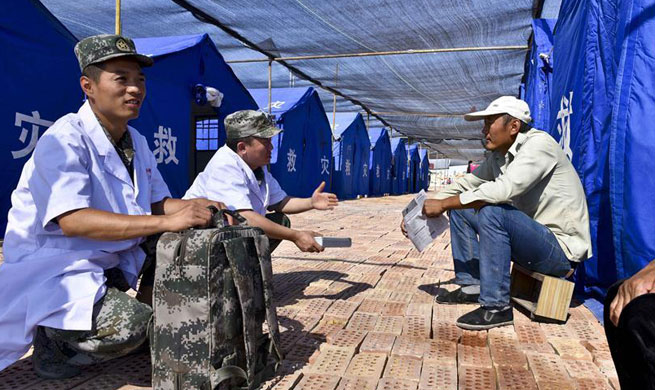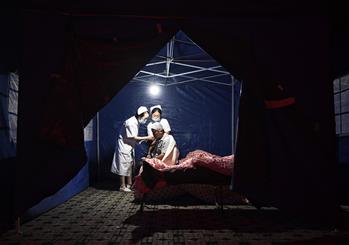BEIJING, Aug. 16 (Xinhua) -- In 2012, Chinese director Guo Ke made a documentary film named "Thirty Two." Two years later, he made another called "Twenty Two." When that second film debuted on Monday, the "22" it featured had became just eight.
The eight are the surviving "comfort women" Guo featured in the documentary, women, now in their 90's, who had been forced into sex slavery by the Japanese army during WWII.
The film became an unexpected hit after its public debut, with box office revenue on the first day exceeding 10 million yuan (about 1.5 million U.S. dollars). However, when Guo prepared to make the documentary he had no money and nearly sold his own house to finance it. Actress Zhang Xinyi donated one million yuan and he raised money through crowd-funding, receiving donations from more than 32,000 people, whose names were acknowledged at the end of the movie.
Some 400,000 women across Asia were forced to be comfort women for the Japanese army during WWII, and nearly half of them were Chinese, according to the Research Center for Comfort Women at Shanghai Normal University.
Guo previously worked as an assistant director on commercial films, until 2012 when he read a news report about a former comfort woman named Wei Shaolan.
Wei, 97, was captured by Japanese soldiers in the winter of 1944 with her infant daughter. She was taken to a house where she was raped and told her daughter would be killed unless she became a sex slave.
When Wei finally escaped three months later, her daughter soon died from diarrhea and she found out she was pregnant. Wei's son, Luo Shanxue, experienced discrimination throughout his life and was taunted with the nickname "Jap boy." He never married.
"I was deeply touched by their story, and I believed that the stories of more former comfort women should be told," Guo said.
In 2012, he completed his first documentary "Thirty Two," which took its name from the number of survivors at that time who had admitted being former comfort women.
The film was welcomed by audiences worldwide and won several awards both domestically and abroad, but Guo was not satisfied.
"I blamed myself for focusing too much on technique and pushing the interviewees into deep sadness with cruel questions about the past," he said, adding that the plot, based on the experiences of Wei and her son, was too dramatic.
Two years later, Guo started making his second documentary about the same topic. His 30-member team travelled over 12,000 kilometers and filmed in 29 locations, interviewing 22 former comfort women.
This documentary was filmed in a completely different way. Guo tried to enter the emotional world of the women, treat them as individuals no different from his own grandmothers and record their daily lives.
In the movie, Mao Yinmei, an ethnic Korean woman who had lived in China for more than 70 years, sings the Korean folk song Arirang; Li Ailian feeds several street cats; and Lin Ailan keeps many knives at home to defend herself.
"I learned how to record things more objectively," Guo said. "If I had expected their acting to match my filming skills, that would have been disrespectful."
Guo said that when most people hear the phrase comfort women, they first think of the women as evidence of war crimes or show sympathy towards them.
But he said that saw peace and tranquility in the elderly women. "They showed no emotional outbursts. Most of the time they just sat in their homes in silence," Guo said
While the women had lived with the shame of the label comfort women, Guo said that it was their everyday lives that he found most touching. He enjoyed sitting talking with them and watching them do their daily chores.
"There is no need to tell the audiences who comfort women are, the film shows the lives of these women who were traumatized in the war," he said.
The documentary has won praise from audiences and members of the Chinese film industry.
"Please pay more attention to this documentary," well-known director Feng Xiaogang wrote on his Sina Weibo social media account. While actor Huang Bo said "it is not only a film, but a piece of history which should always be remembered."
However, some were critical of the documentary.
"I must say that as a documentary, it is not good enough as many details are missing," said a well-known Chinese film critic nicknamed Du Sir. "But it deserves our applause. The victims felt uneasy talking about their suffering and the director couldn't bear to dig deeper. Why? Because bias won't disappear overnight, and the victimizer won't apologize, even if they tell their stories."
Huang Youliang, 90, one of the women Guo interviewed, died two days before release of the film.
She was the last of a group of 24 Chinese former comfort women who had attempted to sue the Japanese government for war crimes. All of their attempts failed and Huang never received justice or the apology she had longed for for most of her lifetime.
Some 14 of the 22 women featured in the documentary have passed away since 2014. Across the Chinese mainland, only 14 known comfort women are still alive, according to the Research Center for Comfort Women.
"If the film makes any profit, we will donate it to NGOs working for comfort women," Guo said. "We will also visit the women each year, trying our best to help them."
Although the film began and ended with funerals, many of the elderly women want to live as long as possible. Some still waiting for an apology from Japanese government.
"It is such a beautiful world," Wei Shaolan said. "I want to live to see more, however difficult life is."
















